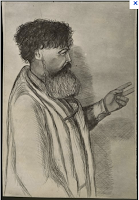Te Whiti
 Te Whiti O Rongomai was born in 1830 in Ngamotu, Taranaki during the Musket wars. Te Whiti was the son of Tohukakahi who was a minor chief of the Te Ati Awa tribe. He lived at the coast near Parihaka until 1865 when his village got burned down. He refused to take up arms but the following year he moved his settlement further inland which later on was named Parihaka. Te Whiti attended Reimenschneider’s Mission School and was extremely good at Bible studies. Already early in his life; Te Whiti was identified as a teacher and a prophet and a lot was done to ensure his safety.
Te Whiti O Rongomai was born in 1830 in Ngamotu, Taranaki during the Musket wars. Te Whiti was the son of Tohukakahi who was a minor chief of the Te Ati Awa tribe. He lived at the coast near Parihaka until 1865 when his village got burned down. He refused to take up arms but the following year he moved his settlement further inland which later on was named Parihaka. Te Whiti attended Reimenschneider’s Mission School and was extremely good at Bible studies. Already early in his life; Te Whiti was identified as a teacher and a prophet and a lot was done to ensure his safety.By 1870 Parihaka had become the biggest village in the country and in 1879 the Europeans started invading their land. Te Whiti was a spiritual man and preached Christian teachings. He led the Parihaka movement with Tohu Kakahi and they protested peacefully against the Europeans who unfairly took away their land. Te Whiti forbade his people to use arms and he discouraged greed and violence but he instructed his people to keep on ploughing the land that had been taken away from them. Arrests followed; the ploughmen didn’t put up a fight and they got treated very badly; they also got imprisoned and taken to the South Island. The protest however did not stop there; the Maori pulled out all the survey pegs and continued to plough the land.
On the 5th of November 1881 members of the parliament came to Parihaka, and the Maori greeted them warmly. An hour later Te Whiti and Tohu were taken to prison on the South Island. As soon as they were arrested, the army started burning down the village. It only took them two weeks to destroy all of the houses and two months to destroy all of the crops. The cattle and pigs got slaughtered and then taken away. In prison, Te Whiti learned how to use European technology and it is believed that Te Whiti was the first Maori to use a telephone at a Christchurch railway. He also learned how to use a saw to cut plate steel. While Te Whiti was in prison he played a lot of mind games with the guards to try to make them doubt their own sanity. One of the ways that he tried to do this was by putting sugar in his soup and salt in his porridge.

Te Whiti returned to Parihaka with his son in law, Tare Waitara. When Te Whiti returned; Parihaka started to modernize itself. Te Whiti used what he learned in prison to make changes to Parihaka. At the end of the war all people who were imprisoned were let out and Parihaka was later thought to be ahead of its time. It had running water, lighting and drainage. Tohu died a few months apart of Te Whiti who died on the 18th of November 1907. Te Whiti’s followers started to wear the white albatross feather as a symbol of protecting the spirit and believes of Parihaka.
I think that Te Whiti is an inspirational leader because he believed in peace and he refused to use weapons to win the war. This makes me find him even more inspirational! He fought for the rights of his people and he believed in himself; and most important of all: he NEVER gave up! I think that everyone should learn from him and use him as an example: fight for peace; with peace.
No comments:
Post a Comment